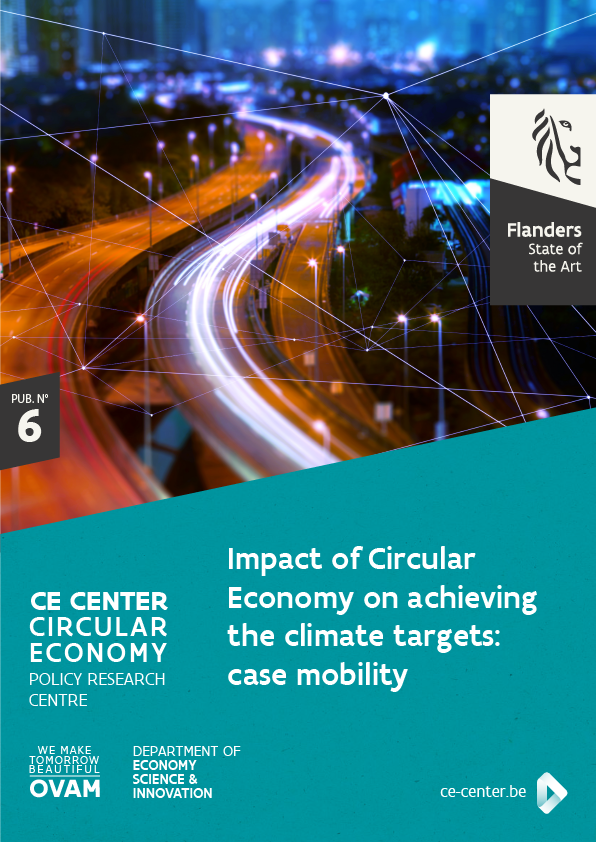6. Impact of Circular Economy on achieving the climate targets: case mobility
Impact of Circular Economy on achieving the climate targets: case mobility
Maarten Christis (VITO), An Vercalsteren (VITO)
May 2019
 This study starts from the draft version of the Flemish Climate Policy plan and assesses the climate impact reduction of specific measures and strategies, with the objective to illustrate the added value of circular economy, which is from nature focusing on reducing the material footprint. The study looks at the climate impact from a consumption or footprint perspective, thus starting from Flemish consumption and including the value chain taking place in Flanders as well as outside Flanders. Territorial GHG-emissions are included separately to distinct between the effect on a global scale and on a Flemish scale. The mobility sector has been selected as a study case. The study focusses on passenger transport by car only.
This study starts from the draft version of the Flemish Climate Policy plan and assesses the climate impact reduction of specific measures and strategies, with the objective to illustrate the added value of circular economy, which is from nature focusing on reducing the material footprint. The study looks at the climate impact from a consumption or footprint perspective, thus starting from Flemish consumption and including the value chain taking place in Flanders as well as outside Flanders. Territorial GHG-emissions are included separately to distinct between the effect on a global scale and on a Flemish scale. The mobility sector has been selected as a study case. The study focusses on passenger transport by car only.
The Flemish Climate policy plan starts from the objective of reducing the GHG emissions in Flanders with 35% by 2030 relative to 2005, following the Belgian target set by the EU. The plan identifies efforts for different sectors and sets sector-specific (sub)targets if necessary. Starting from the prognoses and targets defined in the Flemish policy plan 2021-2030, in this study three future scenarios are defined for the mobility sector for which the effect on GHG-emissions is assessed. GHG-emissions are calculated from a territorial and footprint perspective.
This study focusses on passenger transport by car only, this is reflected as well in the scenarios. The specific reduction target for passenger transport in the Flemish Climate Policy plan has been set at 51%. Each scenario focusses on a specific strategy (linked to specific parameters), e.g. electrification of the car park is only focussed on in the Technofix scenario, not in the CCS and LCS scenario. This allows to better assess the individual effect of a specific change/strategy and to create a better insight in the efforts required to reach a specific target or implement a specific strategy.
In total four scenarios are defined:
- Linear BAU scenario
This scenario serves as a reference and is comparable to the BAU-scenario defined in the Flemish climate policy plan. - Technofix scenario (TEC) –100% new EV in 2030
his scenario assumes that by 2030 only electric vehicles are sold. The linear increase starts in 2020 and in 2030 100% of the new vehicles sold are battery electric vehicles. - Linear climate scenario (LCS) – Drastically reduce demand for car transport to reach climate target in 2030
This scenario assumes that the climate goal for passenger road transport is reached by 2030 (-51% of territorial GHG-emissions compared to the 2015-value). This is realized by driving much less vehicle kilometres and by using more energy efficient vehicles. - Circular climate scenario (CCS) – Drastically increase occupancy rate by implementing circular strategies (sharing, pooling, …) to reach climate target in 2030
This scenario assumes as well that the climate goal for passenger road transport is reached by 2030 (-51%). Additional circular economy strategies (car sharing, ride sharing, etc.) are implemented to reduce the effort requested from consumers, although a significant change in behaviour remains necessary.

.png)






